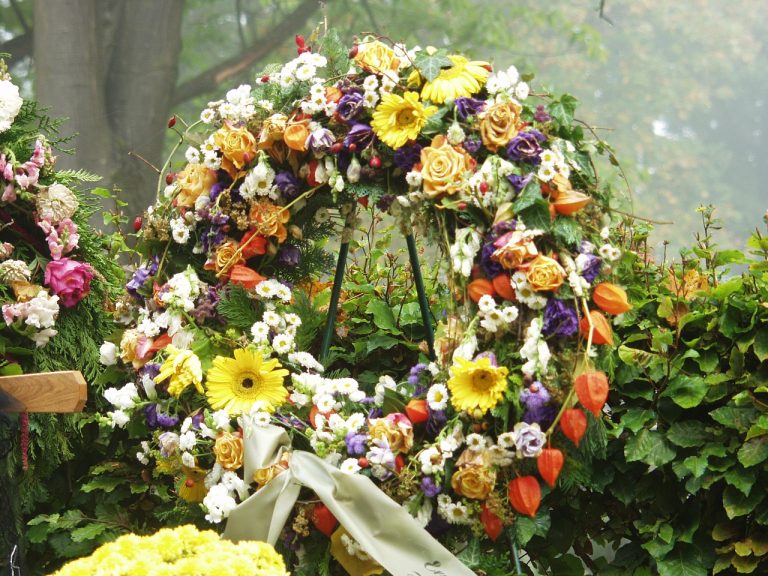Romantics will tell you that fresh flowers are perfect objects of condolence because they symbolize the beauty and brevity of life; allergics will tell you that they would prefer their sniffles and tears at a funeral to be from grief. Whichever position you hold, I hope you’ll agree with me that fresh flowers can cost a lot for the amount of time they last – which are just a couple of the reasons you might want to consider other alternatives to flowers at funerals.
10 Inexpensive Alternatives to Sending Flowers
When the deceased was well known, a grieving family may receive so many flowers that they hardly notice the particular arrangement you lovingly selected. Often, other means of condolence can be better appreciated and less expensive than fresh flowers.
- Send a potted plant. For those who want to stick close to tradition, consider sending a potted plant from your garden in a basket or pot from a thrift shop; grieving family members can transplant your gift into their yard and have a lasting memorial to their loved one.
- Donate to charity. This is becoming more common; many obituaries will suggest a favored charity to receive gifts in lieu of flowers. If no charity is suggested, be sure to choose one the deceased would appreciate; don’t give to PETA if his favorite meal was surf and turf or donate to a church if she was an atheist.
- Housesit during the funeral. Consider housesitting during the funeral, particularly if you did not know the deceased well but are close to a family member. Sometimes homes of grievers are targets for burglars who browse the obituaries looking for names of family members and funeral times.
- Offer babysitting services. Likewise, many families could use a babysitter during the funeral. Families with children too small to attend the funeral would greatly appreciate having someone they know to stay with the young ones so that everyone else can attend. If you plan to attend the funeral yourself, offer to take the kids away for a few hours while the adults make funeral arrangements.
- Write a letter. Tell the family how much you appreciated the person who died. A letter works well if you were closer to the deceased than to the family. Tell stories about their loved one that they might not have heard; recall fond memories so that they have an opportunity to smile during a sad time.
- Create a photo collage. You may be able to display a photo collage of the deceased at the meal for the funeral. A collage gives mourners something to gather near and often sparks memories for those who see it.
- Cook a meal for the family. If you don’t cook well, consider putting together a tray of lunch meat (assuming they are not vegetarians) so that the family and those who visit during the days following the death have something to prepare easily when they get hungry. (Food is often the last thing on their minds.)
- Offer to help with laundry or run errands. It’s difficult to manage these duties alone while planning the funeral or managing details of the estate. One fewer thing on a to-do list can be a big relief for someone who is grieving.
- Offer correspondence services. If you know the family well, offer to make a list of names and addresses of everyone who sent condolences, to make calls to far-away friends and relatives who might not have heard about the death, or even to answer their incoming calls for a while so they can rest.
- Stick around. Mourners often say that the hardest time is after the funeral when all the commotion has died down, and they are left alone. Be sure to check in on a friend who has lost a loved one several weeks and months after the funeral. Call or send cards each month saying, “You’re still in my thoughts and prayers,” or make a point to schedule more frequent visits if your friend now lives alone.
Of course, nothing is stopping you from ordering flowers. While these are caring or lower cost alternatives, you can always fire up your credit card or debit card and call the florist or order online. In this case, white flowers are the most common and popular. This is because white flowers symbolize innocence, security and peace. Peace lilies are popular, as are white roses and white carnations.
Remember, each person mourns differently. Know the person you are trying to comfort and offer what will be most appreciated. Some will want to talk; others will need some space. If you’re not sure what to do, consider asking your friend how you can best help him or her get through the difficult grieving process.
Do you have any other ideas for alternatives to sending flowers? Share them in the comments below.
Read More
- 10 Financial Hacks for a Funeral
- Can You Get Cheap Coffins at Costco?
- The True Cost of a Mass Shooting
Read the full article here









